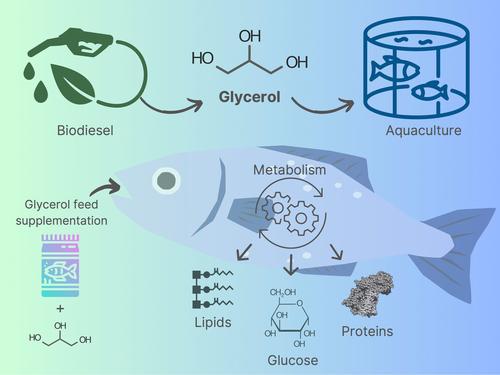当前位置:
X-MOL 学术
›
Rev. Aquacult.
›
论文详情
Our official English website, www.x-mol.net, welcomes your
feedback! (Note: you will need to create a separate account there.)
Glycerol supplementation in farmed fish species: A review from zootechnical performance to metabolic utilisation
Reviews in Aquaculture ( IF 8.8 ) Pub Date : 2024-06-07 , DOI: 10.1111/raq.12930 Margarida Coelho 1 , Mariana Palma 2 , Ludgero C. Tavares 3 , Stéphane Panserat 4 , Ivan Viegas 2 , Leonardo J. Magnoni 5
Reviews in Aquaculture ( IF 8.8 ) Pub Date : 2024-06-07 , DOI: 10.1111/raq.12930 Margarida Coelho 1 , Mariana Palma 2 , Ludgero C. Tavares 3 , Stéphane Panserat 4 , Ivan Viegas 2 , Leonardo J. Magnoni 5
Affiliation

|
Glycerol, an abundant by-product of biodiesel production, has gained attention due to its price and availability for potential commercial applications, and thus utilisation as an animal feed ingredient. This article comprehensively reviews glycerol utilisation in fish and its potential as a dietary ingredient for aquaculture. While dietary inclusion of glycerol may offer cost-effective energy and metabolic intermediates, studies report inconsistent results regarding its effects on nutrient digestibility, zootechnical performance, and product quality. Recent studies however have demonstrated that dietary glycerol supplementation in fish induces metabolic shifts, such as alterations to gluconeogenesis and/or lipogenesis, modifying energy utilisation. Additionally, glycerol has been proposed to reduce protein catabolism, minimising nitrogen excretion and its environmental impact, but its influence on protein retention remains uncertain. Nevertheless, it is important to carefully consider the balance between feed palatability and these potential metabolic alterations when incorporating glycerol in aquafeeds. This review highlights the need for more studies to expand our understanding of glycerol metabolism in fish, since it does not seem to be metabolised by carnivorous species as much as omnivorous. Future research should explore the effects of glycerol supplementation on fish with different feeding habits and in developmental stages, as well as diverse environmental salinities and temperatures. Insight into the impact of impurities and the optimisation of glycerol inclusion in aquafeeds are recommended to support sustainable aquaculture practices and the utilisation of glycerol as a valuable resource.
中文翻译:

养殖鱼类中甘油的补充:从畜牧性能到代谢利用的回顾
甘油是生物柴油生产的丰富副产品,由于其价格和潜在商业应用的可用性而受到关注,因此可用作动物饲料成分。本文全面综述了甘油在鱼类中的利用及其作为水产养殖膳食成分的潜力。虽然饮食中添加甘油可以提供具有成本效益的能量和代谢中间体,但研究报告的关于其对营养物质消化率、动物技术性能和产品质量的影响的结果不一致。然而,最近的研究表明,在鱼类中补充膳食甘油会引起代谢变化,例如糖异生和/或脂肪生成的改变,从而改变能量利用。此外,甘油已被提议可以减少蛋白质分解代谢,最大限度地减少氮排泄及其对环境的影响,但其对蛋白质保留的影响仍不确定。然而,在水产饲料中添加甘油时,仔细考虑饲料适口性和这些潜在代谢变化之间的平衡非常重要。这篇综述强调需要进行更多的研究来扩大我们对鱼类甘油代谢的了解,因为肉食性物种似乎不像杂食性物种那样代谢甘油。未来的研究应探讨补充甘油对不同食性和发育阶段的鱼类以及不同环境盐度和温度的影响。建议深入了解水产饲料中杂质的影响和甘油含量的优化,以支持可持续水产养殖实践和甘油作为宝贵资源的利用。
更新日期:2024-06-07
中文翻译:

养殖鱼类中甘油的补充:从畜牧性能到代谢利用的回顾
甘油是生物柴油生产的丰富副产品,由于其价格和潜在商业应用的可用性而受到关注,因此可用作动物饲料成分。本文全面综述了甘油在鱼类中的利用及其作为水产养殖膳食成分的潜力。虽然饮食中添加甘油可以提供具有成本效益的能量和代谢中间体,但研究报告的关于其对营养物质消化率、动物技术性能和产品质量的影响的结果不一致。然而,最近的研究表明,在鱼类中补充膳食甘油会引起代谢变化,例如糖异生和/或脂肪生成的改变,从而改变能量利用。此外,甘油已被提议可以减少蛋白质分解代谢,最大限度地减少氮排泄及其对环境的影响,但其对蛋白质保留的影响仍不确定。然而,在水产饲料中添加甘油时,仔细考虑饲料适口性和这些潜在代谢变化之间的平衡非常重要。这篇综述强调需要进行更多的研究来扩大我们对鱼类甘油代谢的了解,因为肉食性物种似乎不像杂食性物种那样代谢甘油。未来的研究应探讨补充甘油对不同食性和发育阶段的鱼类以及不同环境盐度和温度的影响。建议深入了解水产饲料中杂质的影响和甘油含量的优化,以支持可持续水产养殖实践和甘油作为宝贵资源的利用。


















































 京公网安备 11010802027423号
京公网安备 11010802027423号